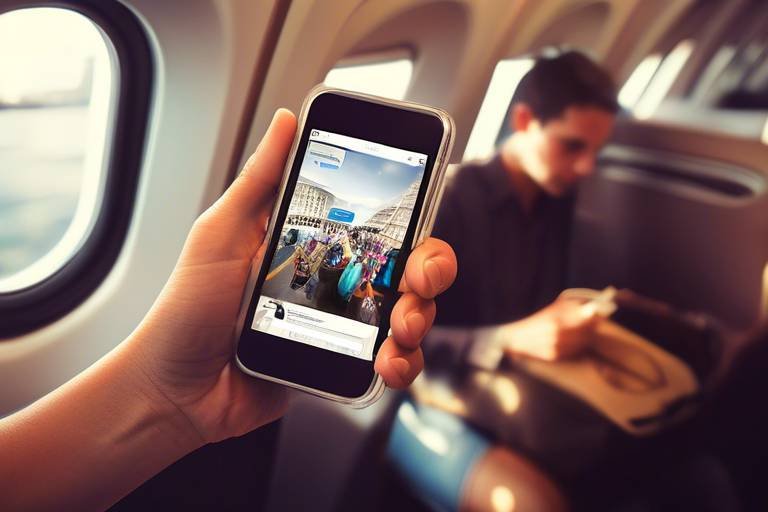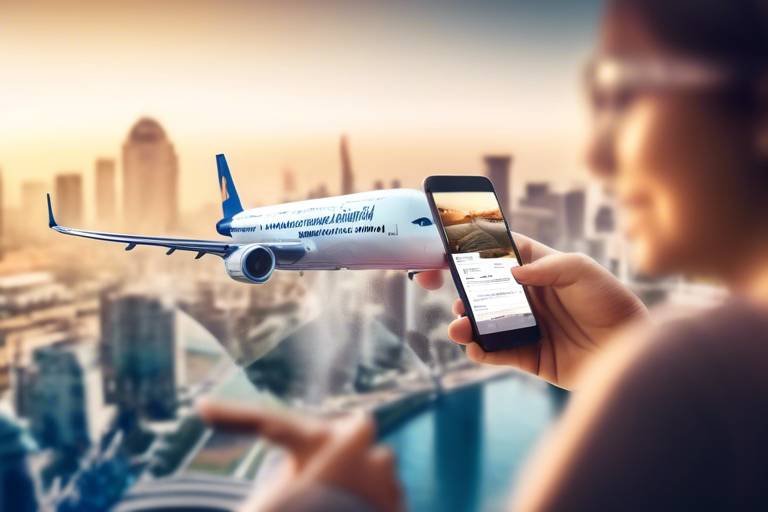The Impact of Technology on the Future of Travel and Exploration
Technology has become an indispensable part of our lives, transforming the way we travel and explore the world. The integration of cutting-edge innovations has not only revolutionized the travel industry but also opened up new horizons for adventurous souls seeking unique experiences. From virtual reality to artificial intelligence, drones to biometric technology, the future of travel and exploration is being reshaped by the rapid advancements in technology.
Virtual Reality (VR) has emerged as a game-changer in the travel sector, offering immersive experiences that allow travelers to explore destinations from the comfort of their homes. By donning a VR headset, individuals can wander through ancient ruins, stroll along exotic beaches, or climb towering mountains, all with a sense of presence that was previously unimaginable. This technology has the potential to redefine how we plan and experience our travels, bringing destinations to life in vivid detail.
Artificial Intelligence (AI) is another key player in shaping the future of travel. Through sophisticated algorithms and machine learning, AI is revolutionizing travel planning processes by providing personalized recommendations, predicting traveler preferences, and optimizing itinerary suggestions. From booking flights and accommodations to discovering off-the-beaten-path attractions, AI is enhancing the overall travel experience by offering tailored solutions that cater to individual needs.
Drone technology has transcended its military origins to become an invaluable tool for exploration and conservation efforts. Drones are now used to map remote locations, monitor wildlife populations, and even assist in search and rescue missions. These unmanned aerial vehicles have the ability to capture breathtaking aerial footage, allowing us to witness the world from a whole new perspective and uncover hidden wonders that were previously inaccessible.
Augmented Reality (AR) is transforming cultural immersion by overlaying digital information onto the physical world, enriching travel experiences with interactive elements and historical insights. Tourists can use AR applications to learn about local traditions, discover hidden stories behind landmarks, and engage with the heritage of a destination in a dynamic and engaging manner. This technology serves as a bridge between travelers and the cultural tapestry of a place, fostering a deeper appreciation for diversity and heritage.
Blockchain technology is enhancing security measures in travel transactions by providing a decentralized and tamper-proof system for storing sensitive data. By leveraging blockchain, travelers can enjoy secure and transparent transactions, protect their personal information, and mitigate the risks of fraud or identity theft. This innovative approach to data management is revolutionizing the way we safeguard our information in an increasingly digital world.
The Internet of Things (IoT) is ushering in a new era of smart travel, where interconnected devices and sensors work in harmony to streamline logistics, deliver personalized services, and optimize resource management. From smart luggage tags that track your belongings to hotel rooms equipped with IoT sensors that adjust to your preferences, this technology is enhancing the efficiency and convenience of travel experiences.
Biometric technology is simplifying airport processes and enhancing security measures by utilizing unique biological traits such as fingerprints, facial recognition, and iris scans for seamless identification. Travelers can breeze through check-in, security screenings, and boarding gates with a simple scan, eliminating the need for physical documents and reducing wait times. This frictionless approach to travel not only enhances convenience but also strengthens security protocols in an increasingly fast-paced world.
Sustainable technologies are playing a crucial role in promoting eco-tourism practices and encouraging environmentally friendly travel options. From eco-friendly accommodations powered by renewable energy sources to carbon offset programs that mitigate the environmental impact of travel, sustainable technologies are shaping a more responsible approach to exploring the world. By embracing these innovations, travelers can contribute to the preservation of natural habitats and support local communities in a sustainable and ethical manner.
Space exploration is undergoing a renaissance fueled by technological advancements that are pushing the boundaries of human discovery and opening up new frontiers beyond our planet. From ambitious Mars missions to the emergence of commercial space travel ventures, cutting-edge technologies are enabling us to explore the cosmos like never before. The convergence of innovation and exploration is propelling us towards a future where space tourism, colonization, and scientific discoveries are no longer science fiction but tangible realities waiting to be explored.
Virtual Reality in Travel
Virtual Reality (VR) in travel is not just a trend but a groundbreaking innovation that has the potential to redefine how we explore the world. Imagine being able to step inside a virtual representation of a destination, feeling the sand between your toes on a tropical beach or standing in awe of historical landmarks without leaving your home. VR technology offers a level of immersion that transcends traditional travel brochures or videos, allowing travelers to have a truly interactive and engaging experience.
One of the most exciting aspects of VR in travel is its ability to revolutionize the way we plan our trips. Instead of relying on static images or reviews, VR allows us to virtually visit hotels, attractions, and even entire cities before making any bookings. This not only helps in making more informed decisions but also builds anticipation and excitement for the upcoming journey.
Moreover, VR opens up a world of possibilities for those with physical limitations or financial constraints. People who may not have the means to travel can now explore the wonders of the world through VR, breaking down barriers and fostering a sense of inclusivity in the travel industry.
As technology continues to advance, the integration of VR in travel is expected to become more seamless and widespread. From virtual tours of remote destinations to immersive cultural experiences, the potential for VR to enhance our exploration of the world is truly limitless. It’s not just about seeing new places; it’s about experiencing them in a way that was once unimaginable.
Artificial Intelligence in Travel Planning
Technology has been revolutionizing the way we travel and explore the world, opening up new possibilities and transforming the entire experience. From virtual reality to artificial intelligence, drones to blockchain, the future of travel is being shaped by cutting-edge technologies that promise to enhance our journeys in ways we never imagined.
Artificial Intelligence (AI) is no longer a concept of the future; it is actively reshaping the landscape of travel planning. Imagine having a personalized travel assistant that understands your preferences, anticipates your needs, and curates the perfect itinerary tailored just for you. AI algorithms analyze vast amounts of data to offer recommendations on destinations, accommodations, activities, and even dining options, making the planning process seamless and efficient.
Furthermore, AI-powered chatbots are available 24/7 to assist travelers with real-time updates, booking confirmations, and instant responses to queries. This level of automation not only saves time but also ensures a stress-free travel experience. With AI, travelers can access customized suggestions based on their past behavior and feedback, creating a more personalized and enjoyable journey.
Moreover, AI enhances safety and security by monitoring travel patterns, identifying potential risks, and providing real-time alerts in case of emergencies. This proactive approach to risk management ensures that travelers are well-informed and prepared for any unforeseen circumstances, adding an extra layer of protection and peace of mind.
1. How is technology transforming the travel industry?
2. What are the benefits of using virtual reality in travel?
3. How does blockchain ensure secure transactions in travel?
4. What role does biometric technology play in streamlining airport processes?
5. How are sustainable technologies promoting eco-friendly travel practices?
Drone Technology in Exploration
Drone technology has soared to new heights in the realm of exploration, offering a bird’s eye view of the world like never before. These unmanned aerial vehicles are not just gadgets for enthusiasts; they are becoming indispensable tools for scientists, researchers, and adventurers alike. Imagine sending a drone to map out uncharted territories, delve into the depths of dense forests, or even soar over majestic mountains without ever leaving the ground. The possibilities are as vast as the skies themselves.
Equipped with high-definition cameras and advanced sensors, drones are revolutionizing the way we explore remote locations and study wildlife. Scientists can now monitor endangered species from a safe distance, track migration patterns, and conduct aerial surveys with precision and efficiency. Drones have become essential companions in conservation efforts, providing valuable data for protecting biodiversity and understanding ecosystems.
Moreover, drones have proven to be invaluable in disaster response and emergency situations. In the aftermath of natural calamities, these aerial marvels can quickly assess damage, locate survivors, and deliver aid to inaccessible areas. Their agility and speed make them ideal for search and rescue missions, where every second counts in saving lives.
As drone technology continues to evolve, we can expect even greater advancements in exploration. From exploring the depths of the ocean to venturing into space, drones are pushing the boundaries of what is possible. The future of exploration is no longer limited by human capabilities but expanded by the limitless potential of these unmanned marvels.
Augmented Reality for Cultural Immersion
Imagine walking through the ancient ruins of Machu Picchu and suddenly, with the help of a pair of AR glasses, seeing the lost civilization come to life right before your eyes. Augmented Reality (AR) is not just a futuristic concept anymore; it is revolutionizing the way we experience different cultures during our travels. By overlaying digital information onto the physical world, AR enhances cultural immersion by providing interactive insights and historical context to travelers.
Through AR, travelers can delve deeper into the local traditions, rituals, and stories of a destination. It acts as a bridge between tourists and the authentic cultural heritage of a place, enriching the travel experience beyond surface-level sightseeing. Whether you are exploring the streets of Tokyo or wandering through the ancient temples of Angkor Wat, AR can offer a layer of information that transforms your journey into a captivating narrative.
One of the significant advantages of AR in cultural immersion is its ability to bring historical sites and artifacts back to life. Imagine standing in front of the Colosseum in Rome and witnessing gladiator battles in their full glory through AR projections. This technology not only educates travelers about the past but also creates a sense of connection to the heritage of a place, making the travel experience more meaningful and memorable.
Moreover, AR can facilitate language learning and communication with locals by providing real-time translations and cultural insights. It can act as a personal tour guide, offering detailed information about landmarks, artworks, and historical events, making the exploration of a new culture more interactive and engaging.
By integrating AR into cultural immersion experiences, travelers can gain a deeper understanding and appreciation for the diversity of the world. It opens up new possibilities for storytelling, interactive learning, and preserving cultural heritage for future generations. As we embrace this innovative technology, the boundaries between virtual and physical travel experiences blur, creating a dynamic and immersive journey into the heart of different cultures.
Blockchain in Travel Security
Blockchain technology has emerged as a game-changer in ensuring security and transparency in various industries, including travel. When it comes to travel security, blockchain offers a decentralized and immutable ledger system that can revolutionize the way transactions are conducted and data is stored. By utilizing blockchain in travel security, the industry can enhance trust among stakeholders, prevent fraud, and protect sensitive information from cyber threats.
One of the key benefits of implementing blockchain in travel security is the ability to create smart contracts that automatically execute transactions when certain conditions are met. This feature can streamline payment processes, reduce the risk of disputes, and ensure that all parties involved adhere to the terms of the agreement. Additionally, blockchain can provide a secure platform for storing traveler information, such as passport details and payment records, without the need for centralized databases vulnerable to hacking.
Furthermore, blockchain technology can enable secure and transparent sharing of data among different entities in the travel ecosystem, such as airlines, hotels, and travel agencies. Through a decentralized network, information can be verified in real-time, reducing the likelihood of errors and unauthorized access. This not only enhances security but also improves the efficiency of transactions, leading to a smoother travel experience for passengers.
Moreover, blockchain has the potential to revolutionize loyalty programs in the travel industry by offering a secure and traceable system for managing rewards and points. With blockchain, travelers can have greater control over their loyalty benefits, ensuring that they are accurately credited and easily redeemable across various travel services. This can lead to increased customer satisfaction and loyalty, ultimately benefiting both travelers and travel providers.
In conclusion, the integration of blockchain technology in travel security holds immense promise for enhancing the overall safety, efficiency, and trustworthiness of the travel industry. By leveraging the decentralized and transparent nature of blockchain, travel companies can address security concerns, streamline processes, and provide travelers with a more secure and seamless journey.
Internet of Things (IoT) in Smart Travel
The Internet of Things (IoT) has emerged as a game-changer in the realm of smart travel, reshaping the way we experience and navigate the world. By seamlessly connecting various devices and systems, IoT is revolutionizing the travel industry, offering a plethora of benefits for both travelers and service providers.
Imagine a scenario where your luggage communicates with your smartphone to provide real-time updates on its location throughout your journey. With IoT sensors embedded in suitcases, travelers can track their belongings with precision, eliminating the anxiety of lost baggage and enhancing overall travel convenience.
Moreover, IoT facilitates personalized services in smart hotels by adjusting room settings based on individual preferences automatically. From regulating room temperature to customizing lighting and entertainment options, IoT-enabled accommodations offer a tailored experience that caters to the unique needs of each guest.
Efficient resource management is another significant advantage of IoT in smart travel. Airlines utilize IoT sensors to monitor fuel consumption, optimize flight routes, and enhance operational efficiency. By analyzing data in real-time, carriers can make informed decisions that reduce costs, minimize environmental impact, and improve overall travel experiences.
IoT devices also play a crucial role in enhancing safety and security in smart travel environments. Smart airports leverage IoT technology for crowd management, baggage tracking, and surveillance systems, ensuring a seamless and secure journey for passengers. By integrating sensors and cameras, airports can streamline processes, detect potential threats, and respond swiftly to emergencies.
In essence, the Internet of Things is driving a paradigm shift in smart travel, offering a interconnected ecosystem that enhances convenience, personalization, efficiency, and safety. As IoT continues to evolve, its impact on the future of travel and exploration is bound to be transformative, shaping a more connected and intelligent world for adventurers and wanderers alike.
Biometric Technology for Seamless Travel
Biometric technology is revolutionizing the way we travel, offering a seamless and secure experience for passengers around the globe. Imagine a world where your face is your boarding pass and your fingerprint is your passport. With biometrics, this futuristic scenario is becoming a reality, making airport processes more efficient and enhancing security measures.
By utilizing unique physical characteristics such as fingerprints, facial features, or iris patterns, biometric systems verify travelers’ identities with unparalleled accuracy. This not only speeds up check-in, security screenings, and boarding procedures but also reduces the risk of identity fraud and enhances overall travel safety.
Moreover, biometric technology enables travelers to move through airports and immigration checkpoints with ease, eliminating the need for physical documents and repetitive manual checks. Whether it’s facial recognition scanners at security checkpoints or biometric e-gates for border control, these innovations are streamlining the travel experience and minimizing wait times for passengers.
In addition to enhancing convenience and security, biometric technology is also paving the way for personalized travel services. Airlines and airports are increasingly adopting biometric solutions to offer tailored experiences based on passengers’ preferences and profiles. From personalized greetings upon arrival to seamless baggage handling, biometrics are redefining customer service in the travel industry.
Furthermore, the integration of biometric technology with mobile applications and self-service kiosks is empowering travelers to take control of their journey. By simply scanning their biometric data, passengers can access lounges, board flights, and check into hotels effortlessly, creating a frictionless travel experience from start to finish.
In the era of biometric technology, the future of travel is marked by convenience, efficiency, and security. As these innovations continue to evolve, we can expect a seamless travel experience where passengers are effortlessly identified, authenticated, and guided through each step of their journey, setting a new standard for modern travel exploration.
Sustainable Technology in Eco-Tourism
Eco-tourism, the harmonious blend of travel and environmental conservation, has been gaining momentum in recent years as travelers seek more sustainable and responsible ways to explore the world. Sustainable technology plays a crucial role in supporting this movement towards eco-friendly travel practices. From reducing carbon footprints to preserving natural habitats, innovative technologies are reshaping the landscape of eco-tourism.
One significant application of sustainable technology in eco-tourism is the use of renewable energy sources to power accommodations and transportation. Solar panels, wind turbines, and hydroelectric systems are increasingly being integrated into eco-friendly resorts and tour operations, minimizing reliance on fossil fuels and decreasing environmental impact.
Another key aspect is the implementation of smart waste management systems in eco-tourism destinations. Recycling stations, composting facilities, and advanced waste treatment technologies help minimize pollution and promote a circular economy within these environmentally sensitive areas. By adopting sustainable waste practices, eco-tourism sites can preserve their natural beauty for future generations of travelers to enjoy.
Moreover, the introduction of digital tools and platforms is enhancing the visitor experience while promoting sustainable practices. Mobile apps that provide information on eco-friendly activities, wildlife conservation efforts, and local community engagement opportunities empower travelers to make informed choices that support environmental sustainability. These digital solutions also facilitate communication between tourists and conservation organizations, fostering a sense of environmental stewardship among visitors.
Furthermore, sustainable technology is revolutionizing transportation in eco-tourism, with the rise of electric vehicles, biofuel-powered fleets, and bike-sharing initiatives in nature reserves and protected areas. By reducing emissions and promoting alternative modes of transport, these innovations contribute to the overall eco-friendly ethos of sustainable travel.
In conclusion, sustainable technology is driving positive change in the eco-tourism sector by promoting environmental conservation, community engagement, and responsible travel practices. As travelers increasingly prioritize sustainability in their journeys, the integration of innovative technologies will play a vital role in shaping the future of eco-friendly tourism around the globe.
Space Exploration and Technological Advancements
Technology continues to revolutionize the way we travel and explore the world, opening up new possibilities and reshaping the entire industry. In this article, we will delve into the transformative impact of various technological advancements on the future of travel and exploration.
Space exploration stands at the forefront of technological advancements, pushing the boundaries of human innovation and discovery. With cutting-edge technologies, we are witnessing unprecedented progress in exploring the vast cosmos. From ambitious Mars missions to the rise of commercial space travel ventures, the realm of space exploration is expanding like never before.
Technological advancements have paved the way for more efficient propulsion systems, advanced spacecraft designs, and groundbreaking research initiatives. Scientists and engineers are constantly pushing the limits of what is possible, with a keen eye on exploring new frontiers and unlocking the mysteries of the universe.
Moreover, the collaboration between public and private entities has accelerated the pace of innovation in space exploration. Companies like SpaceX and Blue Origin are leading the charge in developing reusable rocket technology and pioneering new approaches to space travel. This partnership between government agencies and commercial enterprises is driving a new era of space exploration.
As we look to the future, technological advancements will continue to play a pivotal role in shaping the trajectory of space exploration. From developing sustainable habitats on other planets to harnessing resources from asteroids, the possibilities are limitless. With each technological breakthrough, we inch closer to realizing our dreams of interplanetary travel and expanding our understanding of the cosmos.
- How is technology revolutionizing the travel industry?
- What are some examples of sustainable technologies in eco-tourism?
- How does biometric technology improve airport processes?
Technology is transforming the travel industry by enhancing convenience, personalization, and efficiency. From AI-powered travel planning to IoT devices for smart travel, technology is reshaping every aspect of the travel experience.
Sustainable technologies in eco-tourism include solar-powered accommodations, electric vehicles for transportation, and waste management systems that promote environmental conservation.
Biometric technology streamlines airport processes by enabling secure and seamless identification of travelers. Biometric scans, such as fingerprint or facial recognition, help expedite security checks and boarding procedures.
Frequently Asked Questions
- What is the impact of virtual reality on the travel industry?
Virtual reality is revolutionizing the way people experience travel by allowing them to explore destinations from the comfort of their homes. It offers a glimpse into different cultures and attractions, enticing travelers to plan their trips with more enthusiasm and knowledge.
- How does artificial intelligence enhance travel planning?
Artificial intelligence streamlines the travel planning process by providing personalized recommendations based on individual preferences. From suggesting ideal destinations to optimizing itineraries, AI ensures a smoother and more tailored travel experience for each traveler.
- What role do drones play in exploration activities?
Drones are instrumental in exploration efforts, aiding in mapping remote locations, conducting aerial surveys, and monitoring wildlife. Their versatility and agility make them valuable tools for researchers, conservationists, and adventurers alike.
- How does augmented reality enhance cultural immersion during travel?
Augmented reality enriches cultural experiences by overlaying digital information onto real-world settings, allowing travelers to learn about local traditions, history, and customs in an interactive and engaging manner. It bridges the gap between tourists and the authenticity of a destination.
- What are the benefits of using blockchain in travel security?
Blockchain technology enhances security measures in travel transactions by providing a transparent and immutable record of transactions. It ensures data protection, prevents fraud, and establishes trust between parties involved in travel-related activities.
- How does the Internet of Things improve smart travel experiences?
The integration of IoT devices in travel enables seamless logistics, personalized services, and efficient resource management. From smart luggage tags to connected hotel rooms, IoT enhances convenience and comfort for travelers throughout their journey.
- What advantages does biometric technology offer for seamless travel?
Biometric technology streamlines airport processes by providing secure identification methods, reducing wait times, and enhancing overall travel efficiency. It offers a hassle-free experience for travelers while maintaining high levels of security.
- How do sustainable technologies contribute to eco-tourism practices?
Sustainable technologies play a crucial role in promoting environmentally friendly travel options by reducing carbon footprints, conserving natural resources, and supporting local communities. They enable travelers to engage in eco-conscious practices and contribute to the preservation of fragile ecosystems.
- What technological advancements are driving space exploration?
Cutting-edge technologies are propelling space exploration efforts, from advancements in propulsion systems to the development of reusable spacecraft. These innovations are paving the way for ambitious missions to Mars, commercial space travel ventures, and the expansion of human presence beyond Earth.
Technology, Future, Travel, Exploration, Innovation, Virtual Reality, Sustainability, Automation, , Technology, Future, Travel, Exploration, Innovation, Virtual Reality, Sustainability, Automation,
Share this content:














Post Comment